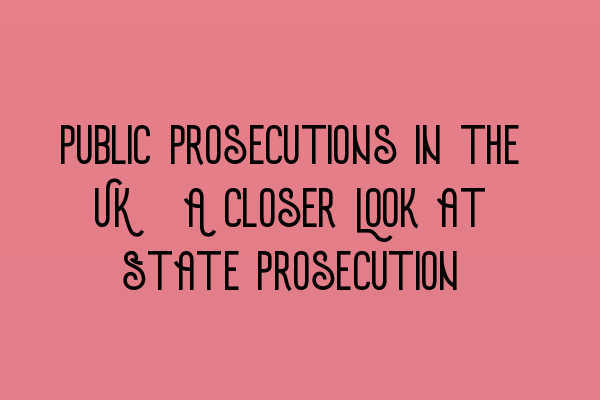Public Prosecutions in the UK: A Closer Look at State Prosecution
As a solicitor specializing in Criminal Law & Practice in the UK, I often come across clients who have questions about the process of public prosecutions. Understanding how the state prosecution works can be crucial for anyone involved in a criminal case, whether as the accused or even as a witness. In this blog post, we will take a closer look at the intricacies of public prosecutions in the UK. So, let’s get started!
1. The Role of the Crown Prosecution Service (CPS)
The Crown Prosecution Service (CPS) is the principal prosecuting authority in England and Wales. They are responsible for making decisions about whether or not to prosecute cases that have been investigated by the police or other law enforcement agencies. The CPS evaluates the evidence provided and determines whether there is a realistic prospect of conviction and if prosecution is in the public interest.
2. The Code for Crown Prosecutors
To ensure fair and consistent decision-making, the CPS follows the Code for Crown Prosecutors. This code sets out the legal tests that must be applied when deciding whether to prosecute. The code also provides guidance on handling cases, including providing advice to the police during the investigation process.
3. The Decision to Prosecute
The CPS considers various factors when making the decision to prosecute, such as the strength of evidence, the seriousness of the alleged crime, and the public interest. They must assess whether there is enough evidence to provide a realistic prospect of conviction and if prosecution is necessary and proportionate.
4. Victims and Witnesses
The CPS also plays a vital role in supporting victims and witnesses throughout the criminal justice process. They provide guidance and assistance, ensuring their rights are protected and that they are kept informed about the progress of the case. This support is crucial in ensuring that victims and witnesses feel safe and confident when giving evidence.
5. The Role of the Defence
Public prosecutions involve a balance between the prosecution and the defence. The defence has the right to challenge the evidence provided by the prosecution and present their own evidence to support the accused. This adversarial system ensures a fair trial and allows both sides to present their case.
6. The Court Process
Once a decision to prosecute has been made, the case proceeds to court. The CPS presents the evidence against the accused, and the defence presents their case. The judge or jury then determines whether the accused is guilty or not guilty based on the evidence presented.
7. Appeals and Review
If a defendant is convicted, they have the right to appeal their conviction or sentence. The CPS also has an internal review process to ensure the quality of its decision-making. This review process is important in maintaining public confidence in the criminal justice system.
In conclusion, public prosecutions in the UK are the responsibility of the Crown Prosecution Service. They play a crucial role in evaluating evidence, making decisions about prosecution, and ensuring a fair trial process. The CPS’s commitment to the Code for Crown Prosecutors and their support for victims and witnesses are essential in upholding justice. If you find yourself involved in a criminal case, it is important to seek legal advice from a qualified solicitor who can guide you through the complex legal process.
I hope this blog post has provided you with a clearer understanding of the workings of public prosecutions in the UK. If you have any further questions or need professional assistance, please do not hesitate to contact me at SQE Criminal Law & Practice Law UK.
